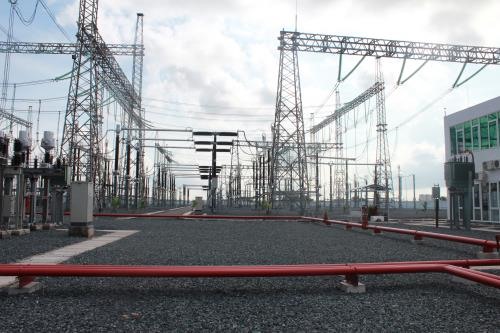 Society
Society

Several contentious issues are dogging implementation of key power projects managed by the Southern Power Management Board (SPBM), contradictory regulations and land evaluation and compensation rules that residents are not ready to accept.
 |
| Power Centre Duyên Hải in the Southern province of Trà Vinh. - VNA/VNS Photo Mai Phương |
HCM CITY – Several contentious issues are dogging implementation of key projects managed by the Southern Power Management Board (SPBM), contradictory regulations and land evaluation and compensation rules that residents are not ready to accept.
The board currently manages investments in 79 power projects that are designed to meet energy demands of 23 provinces and municipalities in the Southern region in the year 2016 and beyond.
Also, the National Power Transmission Corporation (NPT), under the state-owned Việt Nam Electricity (EVN), has assigned SPBM the management of 220kV/550kV projects in the period 2016-2020 periods.
Đoàn Tấn Phong, Director of SPMB, said the most persistent obstacle in the projects’ progress was land clearance and compensation issues, especially the delayed valuation of needed land in HCM City and Southeastern provinces.
Nguyễn Hải Đăng, Head of SPBM’s Compensation Office, said land valuation was not easy since the projects span a vast area lying in different localities.
According to Government’s Decree No.44/2014/NĐ-CP, farm land that falls within the power grid ‘safety corridor’ will not be eligible for compensation.
However, Government’s Decree No.47/2014/NĐ-CP provides that in cases where land is not converted to other uses, but its usage will be seriously restricted, the compensation level will be decided by the provincial People’s Committee.
This discrepancy leads to the fact that compensation for adjacent localities might vary greatly, and unfairly affected households are outraged. They complain and refuse to co-operate, further delaying the land clearance progress.
For the 220kV or 500kV projects, many households have already received compensation, but refused to remodel their houses to follow power grid safety guidelines or flat out rejected compensation, demanding a bigger sum.
The Compensation Office also acknowledges that the compensation for land areas claimed by the state for public or national defence purposes, including socio-economic development projects, is not “close to the market price,” which leads to very unhappy residents and further delays.
“Besides, procedures for enforcement are really complicated, following strict legal provisions, and as a consequence, delay in land transfer for the projects is inevitable,” Đăng said.
Other issues plaguing the clearance progress include the authorities’ simultaneous use of two types of topographies, unofficial land-use rights transfer between people, overlapping project zones, requiring adjustments to original plans.
Until 2018, the Southern region will depend largely on the power provided by the power centres of Duyên Hải and Vĩnh Tân. If the thermal power stations Vĩnh Tân 1, Long Phú 1 and Sông Hậu 1, among others, start operating on time, power supply for the Southern region will be assured, experts say.
Tackling the issues
This year, SPMB targets completion of 12 projects with 742.5km of electrical lines and 1,525MVA in combined substation capacity.
Phong said the company had worked in close collaboration with local authorities to facilitate land clearance process.
Problematic cases would be reported to EVN, Ministry of Industry and Commerce, and the Government for support and directives, especially in cases involving key projects.
“We will also step up monitoring and supervising efforts from the very beginning in order to construction errors. All supervisors will be required to have proper qualification documents,” Phong said.
Supervision of subcontractors’ work will be carried out in order to timely make any necessary adjustment, according to Phong. If subcontractors prove incapable, SPMB will administer heavy sanctions, terminate the contract and propose bans to prevent such subcontractors from participating in future projects.
Regarding land clearance, SPBM has asked EVN to further promote information dissemination on land clearance compensation policies, and pay more attention to raising public awareness on the risks of keeping residential houses within the power grid’s ‘safety corridor’ so that people can understand and follow set guidelines.
A policy concerning long-term training for the ‘compensation task force’ must be devised and implemented, to create a group of qualified people who are equipped with necessary knowledge and skills.
In cases where enforcement cannot be carried out against private properties in the ‘safety corridor’ and households refuse to accept compensation, local forces will be tasked with protecting the status quo and preserve public order as the compensation task force carries out their duties.
According to the board, provincial authorities must implement measures to better manage land resources and frequently update project plans in areas under their jurisdiction to ensure consistency and avoid overlapping between local and national projects. – VNS




